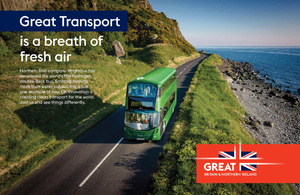Calling for Mission Members – UK Hydrogen Mobility Mission to Taiwan
World news story
The British Office Taipei is calling mission members to participate in a UK Hydrogen Mobility Mission to Taiwan on 17-21 October 2022

Taiwan unveiled its 2050 net zero roadmap in March 2022 that includes a prominent role for hydrogen in decarbonising electricity generation, transportation and heavy industry. This is an opportune time for the UK and Taiwan to come together and explore closer collaboration on this fuel of the future.
To help UK businesses benefit from this exciting opportunity in Taiwan, the Department for International Trade (DIT) and Scottish Development International (SDI) are recruiting UK companies specialising in the following areas to join a UK Hydrogen Mobility Mission to Taiwan to exhibit at the Energy Taiwan in October 2022.
Please note that there remain entry restrictions into Taiwan due to Covid-19, including the need to apply for a special business visa for all international visitors and a mandatory 3-day hotel quarantine upon arrival. These measures could be eased or lifted by October, and we will continue to monitor the situation in the interim.
About Energy Taiwan
Energy Taiwan is the largest and the most iconic renewable energy procurement platform where is an all-star company lineup for various demands. Previous PV Taiwan, Energy Taiwan focuses on Energy Creation, Energy Storage, Energy Saving and Smart System Integration. It includes PV Taiwan, Wind Energy Taiwan, SST Taiwan, HFC Taiwan, Green Finance & Insurance Pavilion and Country pavilions. In 2021, the show attracted 15,590 visitors from 50 countries to profile the breakthroughs and products for a global market. In 2022, Energy Taiwan anticipates over 16,000 people will visit around 950 booths representing technology advancers and service providers.
Key events of this trade mission/What to expect
-
A complimentary place to showcase at the UK-Taiwan Hydrogen Pavilion at Energy Taiwan, a leading trade show in Taipei that is similar in size, scope and stature to All-Energy in the UK
-
Invitation to the 2nd annual UK-Taiwan Hydrogen Mobility Forum
-
Meetings and networking receptions with senior-level government, business and academic stakeholders
-
Company and site visits, including a trip to the southern industrial port city of Kaohsiung where officials have strong ambitions for decarbonising the local economy through hydrogen mobility
Benefits for your organisation
-
Present your technology & service to over 16,000 professional visitors including key stakeholders, government officials and potential partners from Taiwan and the wider region
-
Connect with local companies for business opportunities
-
Meet local stakeholders to understand the development of Hydrogen mobility across Taiwan
-
Learn the capability of Taiwanese solution providers and the scope to cooperate
-
Receive on the ground local support and advice from DIT staff based in Taipei
Please register here to participate.
The deadline to secure a place for the package is Friday, 19 August 2022
Contact person:
Wendy Kan, DIT Commercial Officer at British Office in Taipei
T: +886 2 87582039
Published 10 August 2022
